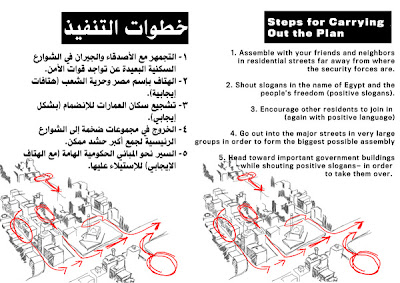While the January 25th revolution was partially organized through Facebook, activists are certainly not restricted to these new social media networks…. and make no doubt about it, this was a well organized revolution. The Atlantic has translated pamphlets distributed to protesters on how to organize and behave.
What one notes in this pamphlet is the advice not to use Twitter or Facebook because they are monitored by the state. These pamphlets were distributed the “old” fashioned way: photocopies given out by hand.
This is not to say that new social networking sites are irrelevant. What I mainly noticed in the days leading up to the start of the protests was that many of my friends in Egypt who are on Facebook began openly posting anti-government status updates. It was surprising to me because many of them are elites or at least members of upper middle class. In essence, one might hypothesize that the role of new social media networks is to help rally or tap into anti-government sentiment which is often not voiced loudly in public, but the actual organization and dissemination of strategy and tactics still occurs off-line.
Vikash is an Associate Professor of Political Science and Asian Studies at Hobart and William Smith Colleges in Geneva, NY. His main areas of academic interest are (post-) globalization, economic development, and economic freedom, with a regional focus on South Asia



0 Comments